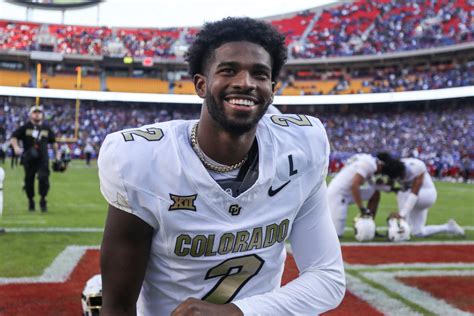
Shedeur Sanders, the star quarterback for the Colorado Buffaloes, believes he knows the source of the vast majority of the online criticism directed at him, attributing it primarily to “gambling.” Sanders made the claim on X (formerly Twitter), suggesting that his performance on the field significantly impacts bettors and their reactions.
Shedeur Sanders, the quarterback for the Colorado Buffaloes, believes a significant portion of the online negativity he faces stems from gambling interests. In a recent post on X, formerly known as Twitter, Sanders implied that individuals betting on college football games are heavily invested in his performance and subsequently react strongly, often negatively, based on whether or not he meets their expectations. This revelation has sparked discussion among fans, analysts, and within the sports media regarding the impact of legalized sports betting on athletes and the increase in online harassment they endure.
Sanders’ assertion comes amidst a broader national conversation about the relationship between college athletics and the rapidly expanding world of sports gambling. With more states legalizing sports betting, the stakes are higher than ever, and the pressure on athletes to perform consistently has intensified.
“I know who’s driving 99% of my online hate,” Sanders stated in his post on X. “It comes from gambling. Dawg, I don’t know why y’all think I don’t know. I can just tell by the way y’all be talking.” This direct statement highlights Sanders’ awareness of the online environment and his perception of the motivations behind much of the criticism he receives.
The intersection of sports and gambling is not new, but the advent of mobile betting and the proliferation of online platforms have amplified the phenomenon. Fans now have immediate access to betting odds and the ability to place wagers on virtually every aspect of a game. This has created a heightened level of scrutiny on individual player performances, as even minor mistakes can have significant financial consequences for bettors.
The issue of online harassment directed at athletes is a growing concern across all sports. Athletes are often subjected to personal attacks, insults, and even threats via social media. The anonymity afforded by these platforms can embolden individuals to express sentiments they might otherwise keep private. While some level of criticism is inherent in professional and collegiate athletics, the line is often crossed into abusive and threatening behavior.
Sanders’ comments underscore the psychological toll that this constant barrage of negativity can take on athletes. The pressure to perform well is already immense, and the added burden of dealing with online harassment can have a detrimental effect on mental health and overall well-being.
“It’s tough to block out the noise completely,” said one sports psychologist familiar with the issue. “Athletes are human beings, and they’re going to see some of the things that are being said about them. It’s important for them to have strategies for coping with that negativity and focusing on their performance.”
Sanders’ claim raises questions about the responsibility of social media platforms to address online harassment and the role of sports leagues and universities in protecting their athletes. While platforms have implemented measures to combat abuse, these efforts are often seen as insufficient. Similarly, sports organizations are grappling with how to balance the need to protect athletes with the principles of free speech and open dialogue.
The rise of legalized sports betting has also prompted discussions about the potential for match-fixing and other forms of corruption. While there is no evidence to suggest that Sanders or any other college athlete is involved in such activities, the increased financial stakes create a greater incentive for individuals to attempt to influence the outcome of games.
Universities and athletic conferences have implemented policies to address these concerns, including educating athletes about the dangers of gambling and monitoring betting activity for suspicious patterns. However, these efforts are still in their early stages, and it remains to be seen whether they will be effective in preventing corruption.
The discussion surrounding Shedeur Sanders’ comments also highlights the need for greater awareness and education about responsible gambling. Many individuals who engage in sports betting do so responsibly and within their means. However, for others, gambling can become an addiction that leads to financial ruin and other serious problems.
Resources are available for individuals who are struggling with gambling addiction, including counseling, support groups, and self-help materials. It is important for individuals to recognize the signs of addiction and seek help if they need it.
In addition to addressing the issue of online harassment, Sanders’ comments also raise broader questions about the culture of fandom in sports. While passionate fans are an integral part of the sporting experience, there is a fine line between enthusiasm and toxicity. When fans become overly invested in the outcome of games, they may be more likely to engage in abusive behavior towards athletes.
“We need to create a culture where it’s okay to be disappointed in a loss without resorting to personal attacks,” said one sports commentator. “Athletes are giving their all on the field, and they deserve to be treated with respect, regardless of the outcome.”
Shedeur Sanders’ situation is not unique. Many other athletes have spoken out about the online harassment they have endured, and the problem is likely to persist as long as social media platforms provide a forum for anonymous and abusive behavior. However, by raising awareness of the issue, Sanders and others are helping to create a dialogue that could lead to positive change.
The challenge for sports organizations, social media platforms, and society as a whole is to find ways to balance the excitement and passion of sports with the need to protect athletes from online harassment and abuse. This will require a multi-faceted approach that includes stricter enforcement of social media policies, greater education about responsible gambling, and a shift in the culture of fandom towards greater respect and civility.
Ultimately, the issue of online harassment is a reflection of broader societal problems. The anonymity of the internet can embolden individuals to express prejudices and engage in abusive behavior that they might otherwise keep private. Addressing this problem will require a concerted effort to promote greater empathy, understanding, and respect in all aspects of life.
Expanding the Context and Analysis
Shedeur Sanders, playing quarterback for a high-profile team like the Colorado Buffaloes under the leadership of his father, Coach Deion Sanders, is naturally under intense scrutiny. This scrutiny has only increased given the team’s initial successes followed by subsequent struggles during the season. The intersection of high expectations, celebrity status, and the pervasive nature of social media has created a perfect storm for online criticism.
The Colorado Buffaloes’ season began with considerable hype, fueled by significant roster changes and the arrival of Deion Sanders. Shedeur Sanders, as the starting quarterback, was immediately thrust into the spotlight. Early victories against TCU and Nebraska further amplified the attention, with Shedeur showcasing impressive passing abilities and a confident demeanor. This initial success led to increased media coverage and, consequently, a surge in betting activity surrounding the team.
However, as the season progressed, the Buffaloes faced tougher opponents, and their performance declined. This downturn in performance directly impacted bettors who had placed wagers on the team’s success. The frustration and financial losses experienced by these bettors often manifested as online criticism directed at Shedeur Sanders.
The dynamics of online sports betting are complex. Bettors often have emotional and financial investments in the outcomes of games, leading to heightened reactions when their bets don’t pay off. Social media platforms provide an easily accessible outlet for expressing these frustrations, and athletes like Shedeur Sanders become targets for criticism, often unfairly.
Sanders’ assertion that gambling drives 99% of his online hate is a strong statement, and while it’s difficult to quantify the exact percentage, it highlights the significant role that gambling plays in shaping online narratives surrounding athletes. The financial incentives associated with sports betting can amplify negative emotions and lead to abusive behavior.
The issue of online harassment extends beyond just Shedeur Sanders and the Colorado Buffaloes. It’s a pervasive problem affecting athletes across various sports and levels of competition. The anonymity and lack of accountability on social media platforms create an environment where individuals feel emboldened to engage in abusive behavior.
Social media companies have implemented measures to combat online harassment, but these efforts are often criticized as being insufficient. The sheer volume of content posted on these platforms makes it difficult to effectively monitor and moderate abusive behavior. Furthermore, the algorithms that drive social media engagement can often amplify negativity, as controversial or emotionally charged content tends to generate more clicks and shares.
Sports leagues and universities also have a role to play in protecting their athletes from online harassment. This can include providing athletes with resources and training on how to manage their social media presence and cope with online negativity. It can also involve working with social media companies to identify and remove abusive content.
However, there are also challenges and limitations to what these organizations can do. Freedom of speech is a fundamental right, and it’s important to balance the need to protect athletes with the principles of free expression. Striking this balance is a complex and ongoing challenge.
The issue of responsible gambling is also relevant in this context. While sports betting can be a fun and entertaining activity for some, it can also lead to addiction and financial problems for others. Promoting responsible gambling practices and providing resources for individuals who are struggling with addiction is crucial.
Education and awareness are key to addressing the problem of online harassment and promoting a more respectful and civil online environment. This includes educating fans about the impact of their words on athletes and promoting a culture of empathy and understanding.
Shedeur Sanders’ willingness to speak out about the online harassment he faces is a positive step in raising awareness of this issue. By sharing his experiences, he is helping to create a dialogue that can lead to positive change. It’s important for athletes to feel supported and empowered to speak out against online abuse without fear of retaliation.
The challenge for the sports community and society as a whole is to create a culture where online harassment is not tolerated and where athletes are treated with respect and dignity. This requires a collective effort from social media companies, sports leagues, universities, fans, and athletes themselves.
Further Expansion: The Broader Impact on College Athletes
The case of Shedeur Sanders highlights a growing trend: the increasing pressure and scrutiny placed on college athletes in the age of legalized sports gambling and ubiquitous social media. This combination presents a unique set of challenges for young athletes navigating their careers.
The rise of Name, Image, and Likeness (NIL) deals has further complicated the landscape. While NIL deals offer opportunities for college athletes to earn money and build their brand, they also increase their visibility and exposure to criticism. Athletes who endorse products or services may face backlash if their performance declines or if they are involved in off-field controversies.
The mental health of college athletes is a growing concern. The pressures of competition, academics, and social life can take a toll, and the added burden of online harassment can exacerbate these challenges. Many colleges and universities are now offering mental health services to their athletes, but there is still a need for greater awareness and destigmatization of mental health issues.
The NCAA has also been grappling with how to address the issue of online harassment. The organization has implemented policies to protect athletes from abuse, but these policies are often difficult to enforce, particularly when the harassment occurs on social media platforms that are outside of the NCAA’s direct control.
The legal landscape surrounding online harassment is also evolving. Some states have passed laws that make it a crime to harass or threaten athletes online, but these laws are still relatively new, and their effectiveness remains to be seen.
One potential solution is to require social media platforms to be more proactive in identifying and removing abusive content. This could involve using artificial intelligence and machine learning to detect hate speech and other forms of online harassment. However, this approach also raises concerns about censorship and the potential for bias.
Another approach is to focus on educating fans about the impact of their words on athletes. This could involve public service announcements, social media campaigns, and other initiatives designed to promote empathy and understanding.
Ultimately, addressing the problem of online harassment requires a multi-faceted approach that involves social media companies, sports leagues, universities, lawmakers, and fans. It’s a complex issue with no easy solutions, but it’s one that must be addressed in order to protect the well-being of college athletes.
The experiences of Shedeur Sanders serve as a reminder of the challenges faced by young athletes in the modern era. As the landscape of college sports continues to evolve, it’s important to prioritize the safety and well-being of athletes and create a culture where they are treated with respect and dignity.
The Impact of Deion Sanders’ Coaching Style
Adding another layer to the situation is the unique coaching style of Deion Sanders. Known for his outspokenness and unwavering confidence, Coach Sanders has brought a level of attention to the Colorado Buffaloes program that is both beneficial and potentially detrimental. While his approach has attracted top talent and generated significant media buzz, it has also made the team a target for critics and rivals.
Deion Sanders’ emphasis on building a winning culture and his willingness to make bold personnel decisions have been both praised and criticized. Some see him as a visionary leader who is transforming college football, while others view him as arrogant and divisive.
Regardless of one’s opinion, there is no denying that Deion Sanders has had a significant impact on the Colorado Buffaloes program. He has raised the profile of the team and attracted a new generation of fans. However, his coaching style also comes with added scrutiny and pressure, both for himself and his players.
Shedeur Sanders, as the quarterback and son of the head coach, is particularly vulnerable to this added pressure. He is not only responsible for leading the team on the field but also for representing the program off the field. This dual role can be challenging, especially in the face of online harassment and criticism.
The relationship between Deion Sanders and Shedeur Sanders is also a factor in the online narratives surrounding the team. Some critics accuse Deion Sanders of nepotism, suggesting that Shedeur is receiving preferential treatment because of his father. Others defend Shedeur, arguing that he has earned his position as the starting quarterback through his talent and hard work.
The dynamics of this father-son relationship add another layer of complexity to the online discourse surrounding the Colorado Buffaloes. It’s important to recognize that Shedeur Sanders is an individual with his own strengths and weaknesses, and he should be judged based on his own merits, not solely on his relationship with his father.
The success of the Colorado Buffaloes program will depend on the ability of both Deion Sanders and Shedeur Sanders to navigate the challenges of online scrutiny and criticism. They must remain focused on their goals and not allow the negativity to distract them from their mission.
The Future of Athlete Protection Online
The ongoing situation underscores the urgent need for improved strategies and policies to protect athletes from online harassment. While existing measures have had some impact, they are clearly insufficient to address the scale and severity of the problem.
One promising area of development is the use of artificial intelligence (AI) to detect and remove abusive content from social media platforms. AI-powered tools can be trained to identify hate speech, threats, and other forms of online harassment. However, these tools are not perfect, and they can sometimes make mistakes, such as flagging legitimate content as abusive.
Another potential solution is to require social media platforms to verify the identity of their users. This would make it more difficult for individuals to hide behind anonymous accounts and engage in abusive behavior. However, this approach also raises concerns about privacy and freedom of expression.
In addition to technological solutions, there is also a need for greater education and awareness about the impact of online harassment. This includes educating fans about the consequences of their words and promoting a culture of empathy and respect.
Sports leagues and universities can also play a role by providing athletes with resources and training on how to manage their social media presence and cope with online negativity. This can include teaching athletes how to block or mute abusive users, how to report harassment to social media platforms, and how to seek help from mental health professionals.
The legal system can also be used to hold individuals accountable for online harassment. Some states have laws that make it a crime to harass or threaten athletes online, and these laws can be used to prosecute offenders.
However, legal action is often difficult and time-consuming, and it may not always be the most effective way to address the problem. It’s important to recognize that online harassment is a complex issue with no easy solutions. Addressing it will require a multi-faceted approach that involves technology, education, and legal action.
The experiences of Shedeur Sanders and other athletes who have been targeted by online harassment serve as a reminder of the importance of this issue. By working together, we can create a safer and more respectful online environment for athletes and ensure that they are able to pursue their dreams without fear of abuse.
FAQ Section
1. What prompted Shedeur Sanders to claim he knows the source of his online hate?
Shedeur Sanders made the claim in a post on X (formerly Twitter), expressing his belief that a significant portion of the online negativity he receives stems from individuals who gamble on college football games and are reacting to his performance. “I know who’s driving 99% of my online hate,” Sanders stated, attributing it to gambling and implying he can discern the motivation behind the criticism based on the way people communicate online.
2. How does legalized sports betting contribute to online harassment of athletes?
Legalized sports betting has intensified the scrutiny on individual player performances, as even minor mistakes can have financial consequences for bettors. The ease of placing bets and the immediacy of online platforms amplify the emotional investment of fans, leading to heightened reactions when their bets don’t pay off. This frustration often manifests as online criticism directed at athletes, sometimes crossing the line into abusive behavior.
3. What measures are being taken to protect athletes from online harassment?
Social media platforms have implemented measures to combat abuse, though these efforts are often seen as insufficient. Sports leagues and universities are also grappling with how to balance the need to protect athletes with the principles of free speech. Universities and athletic conferences have implemented policies to address concerns, including educating athletes about the dangers of gambling and monitoring betting activity.
4. What role do social media platforms play in addressing online harassment of athletes?
Social media platforms are responsible for creating a safe and respectful online environment. They should implement stricter enforcement of their policies against hate speech and abuse. This includes proactively identifying and removing abusive content, verifying the identity of users, and providing resources for athletes to report harassment.
5. How is Deion Sanders’ coaching style related to the online criticism faced by Shedeur Sanders?
Deion Sanders’ outspokenness and confidence have brought significant attention to the Colorado Buffaloes program, both positive and negative. His high-profile approach and emphasis on building a winning culture have made the team a target for critics. As the quarterback and son of the head coach, Shedeur Sanders is particularly vulnerable to this added scrutiny, facing accusations of nepotism and increased pressure to perform.









